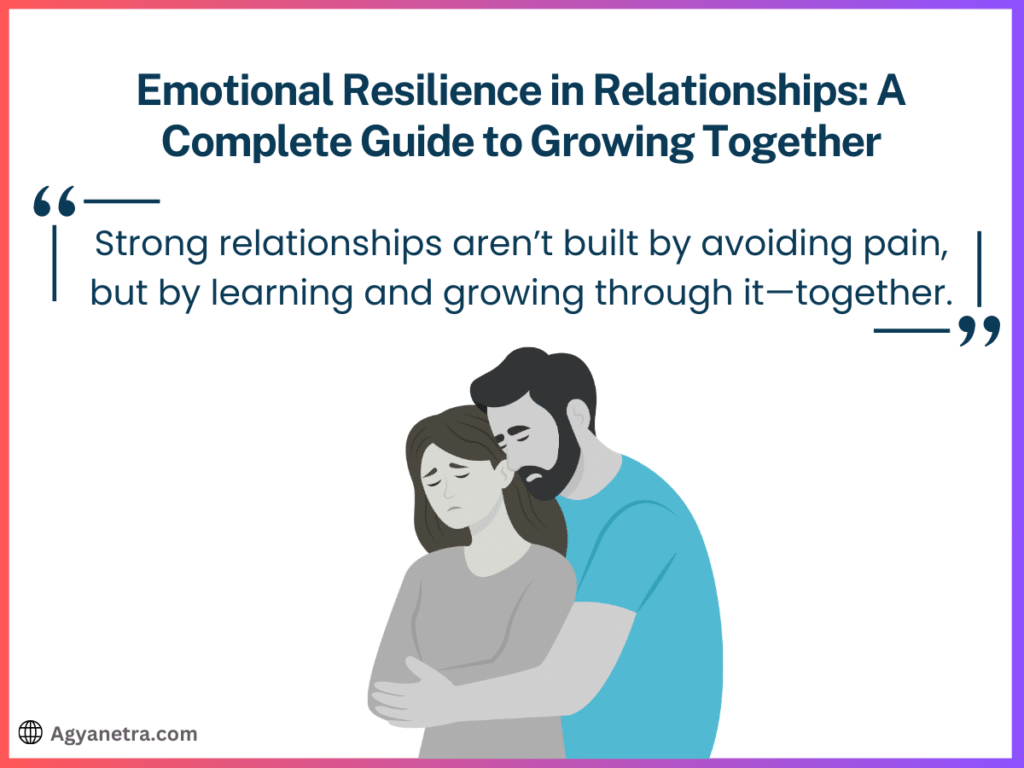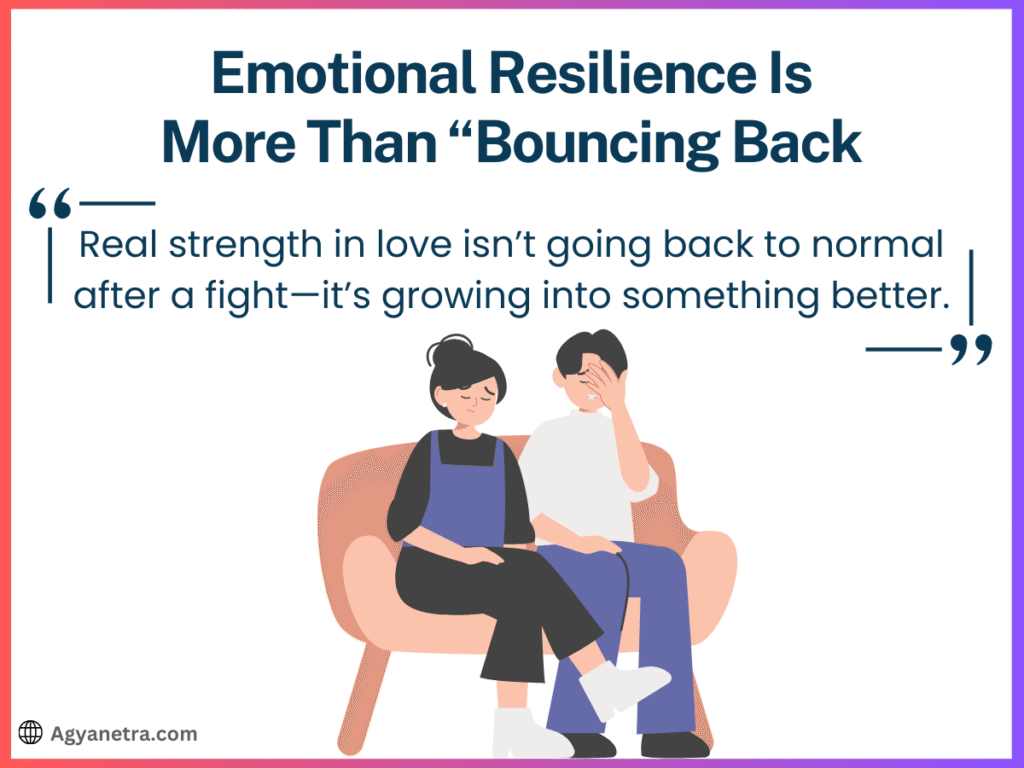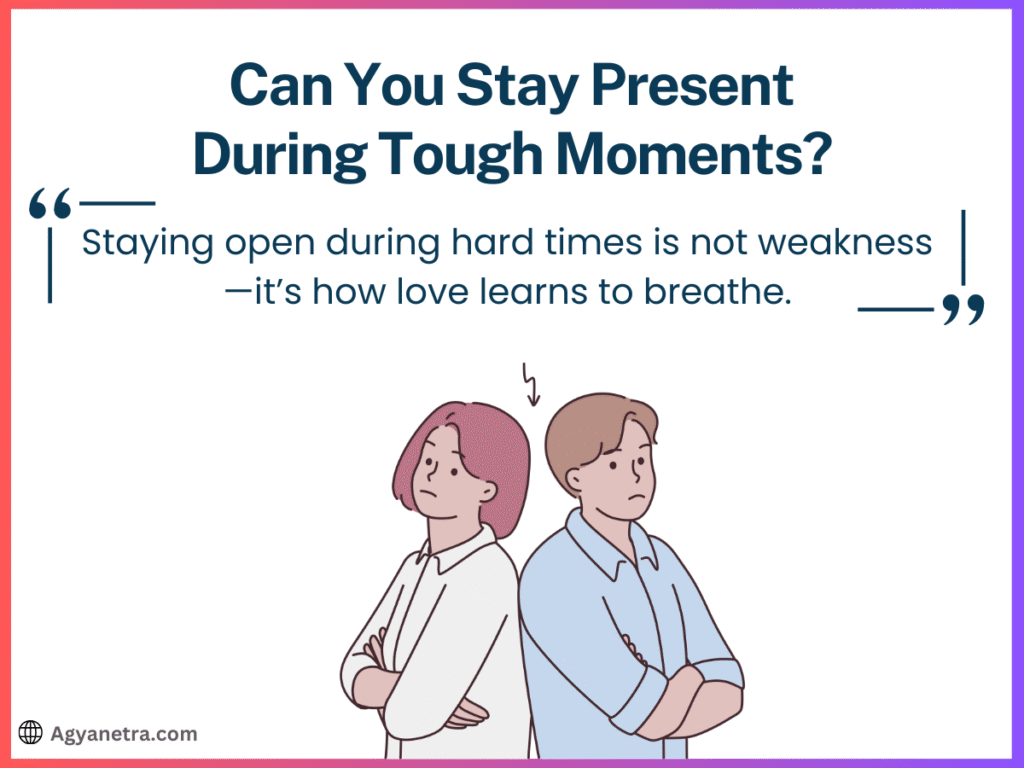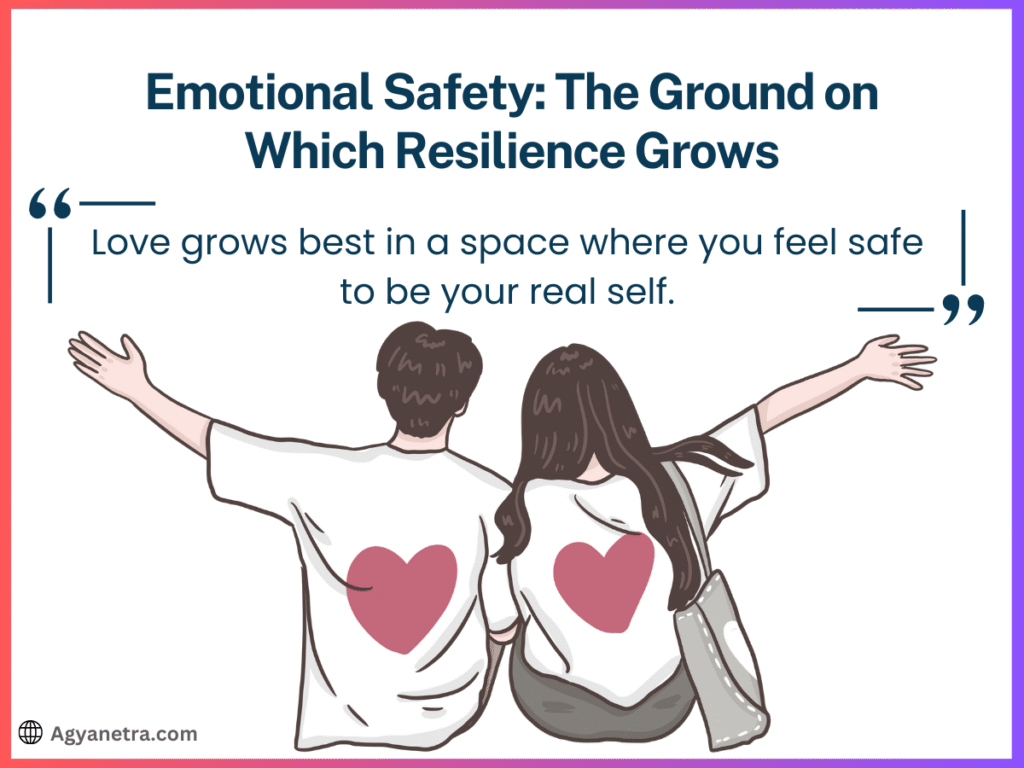Emotional Resilience in Relationships is something every couple should understand—but many don’t know where to begin.
What does it really mean to be emotionally strong in love? Is it about not crying, avoiding fights, or staying silent just to keep the peace?
If you’ve ever felt confused during a tough moment with your partner or wondered how to handle emotional stress without breaking your bond, you’re not alone.
This guide will help you see emotional resilience in a new light—one that’s all about growing, healing, and staying connected as a team.
Keep reading to discover simple ways to build emotional strength together, respond instead of react, and create a relationship that not only survives hard times—but grows stronger through them.
Emotional Resilience in Relationships: Meaning Explained
Emotional resilience in a relationship is the ability to deal with emotional ups and downs without losing connection with your partner.

It’s not about suppressing emotions or acting tough—it’s about understanding yourself and your partner better during emotional moments.
For example, imagine you and your partner have a disagreement. A resilient approach would involve recognizing your emotional triggers, staying open to communication, and trying to solve the problem together, rather than reacting with anger or withdrawal.
This kind of emotional strength in a relationship comes from patience, emotional intelligence, and a willingness to grow together.
Emotional Resilience Is More Than “Bouncing Back”
We often think of resilience as bouncing back after a crisis. While that’s partly true, emotional resilience in relationships goes further.

It’s about moving forward, learning from the challenges, and evolving as a couple.
Traditional view vs. growth-focused view
- Traditional view: You recover from fights and return to how things were before.
- Growth-focused view: You use conflicts as opportunities to learn more about each other and grow closer.
This mindset shift—from bouncing back to bouncing forward—is what makes a relationship more emotionally intelligent and mature. It helps couples build stronger foundations over time.
More Posts Like This
- How to Communicate Effectively in Relationships
- How to Build Strong Family Connections
- How to Handle Conflict in a Relationship
- Balancing Career and Love Life Successfully
The Problem with the “Strong One” in Relationships
Society often expects one partner to be the “strong one”—the person who absorbs all the emotional tension, avoids expressing their own needs, and keeps things calm.
At first, this might seem like a helpful role, but over time it leads to emotional burnout, imbalance, and even resentment.
Real-life example:
If one partner constantly suppresses their feelings to avoid fights, they may feel unseen and unsupported.
Meanwhile, the other partner may not even realize their behavior is affecting the relationship negatively.
True emotional resilience means both people take responsibility for their emotional well-being.
It’s not about one person holding everything together—it’s about building strength as a team.
Why Self-Awareness Is the Foundation of Emotional Strength
You can’t be emotionally resilient in a relationship unless you’re self-aware. Self-awareness means understanding your own emotional triggers, needs, and habits.
Ask yourself:
- What usually upsets me in arguments?
- Am I reacting from past wounds or current emotions?
- Do I project my fears or insecurities onto my partner?
When you become aware of your emotional patterns, you can pause before reacting.
You respond with clarity instead of impulse, which helps avoid unnecessary damage in communication.
This ability to pause and reflect builds emotional safety and makes your bond stronger over time.
Emotional Flexibility: Adapting Without Losing Yourself
In long-term relationships, people often create unspoken rules—how affection should be shown, how arguments should end, or what’s acceptable to say.
These expectations can create emotional rigidity.
But emotional resilience thrives on emotional flexibility—the ability to adapt, listen, and grow without losing your sense of self.
Real example:
Let’s say your partner prefers talking about issues right away, but you need time to think.
Emotional flexibility means learning how to meet halfway—maybe agreeing to revisit the topic after a short break—so both needs are respected.
Being emotionally flexible doesn’t mean giving up your values.
It means being open to unlearning rigid patterns and growing into more compassionate ones.
Can You Stay Present During Tough Moments?
One of the biggest signs of emotional resilience in relationships is your ability to stay emotionally present even when things are difficult.

Ask yourself:
- Can I stay open to repairing the bond after a heated argument?
- Can I support my partner without shutting down emotionally?
- Can I sit with discomfort without rushing to fix everything?
These are not signs of emotional weakness—they’re proof of emotional maturity and deep love.
Being able to hold space for each other during hard times creates a safe emotional environment where both partners feel heard and respected.
Building Collective Resilience as a Couple
Many people believe emotional resilience is a personal trait. But in relationships, it needs to be shared.
Collective resilience means both partners commit to healing, growing, and supporting each other through emotional challenges.
What shared resilience looks like:
- Both partners take responsibility for emotional healing.
- They practice co-regulation—helping each other calm down during emotional stress.
- They prioritize emotional safety, not passive tolerance.
For example, after an argument, instead of ignoring each other for days, both partners might take time to calm down and then come together to talk honestly and kindly. This habit strengthens the emotional bond and promotes relationship growth.
Conflict Is Not a Crisis, It’s a Chance to Grow
In emotionally resilient relationships, conflict is seen as a tool for deeper understanding—not as a threat to the relationship.
Every disagreement can reveal something important:
- An old emotional wound from childhood
- A fear of being ignored or abandoned
- A desire to feel valued and respected
Instead of fighting to win, resilient couples ask:
- What’s really going on beneath this argument?
- What does my partner need emotionally right now?
- What can I do differently to support them?
This approach turns conflict into a blueprint for deeper connection. It shifts the focus from blame to understanding, and from defense to cooperation.
Emotional Safety: The Ground on Which Resilience Grows
You can’t build emotional resilience without emotional safety.

Emotional safety means both partners feel free to express their thoughts, fears, and needs without being judged or attacked.
What emotional safety includes:
- Being heard without interruption or criticism
- Feeling safe to express vulnerability
- Offering support during emotional low points
When couples create this kind of environment, they don’t avoid difficult conversations. They handle them with care, compassion, and emotional intelligence.
Remember: emotional safety is not about avoiding conflict—it’s about handling conflict with kindness and accountability.
Letting Go of Ego: The Silent Killer of Emotional Resilience
Ego often blocks emotional growth in relationships. When one or both partners focus on being “right” or “winning” arguments, connection and healing take a backseat.
Examples of ego-led thinking:
- I apologized last time, so now it’s their turn.
- I’m not wrong, they’re just too sensitive.
- I won’t speak first—it shows weakness.
Emotionally resilient couples shift their mindset from ego to empathy. They practice emotional humility and say things like:
- I realize I misunderstood you.
- I didn’t handle that well.
- I’m still learning how to express myself better.
This level of honesty and vulnerability is what transforms pain into emotional healing.
Final Thoughts
Emotional resilience in relationships is not about avoiding struggles or being the stronger one all the time.
It’s about showing emotional courage—the willingness to stay connected, heal old wounds, support each other, and keep choosing love even when things get hard.
Choosing growth over guardedness means being open, emotionally aware, and committed to understanding each other deeply.
When couples embrace resilience not just as endurance, but as evolution, they create a love that thrives—not just survives.
In the end, emotional resilience in relationships is not about how strong you are alone. It’s about how well you connect, adapt, and grow together through every season of life.
FAQs
What is emotional resilience in relationships?
Emotional resilience in relationships means the ability to handle stress, disagreements, and emotional ups and downs together. It helps couples stay connected, communicate better, and grow stronger through challenges instead of falling apart.
Why is emotional resilience important in a relationship?
It helps partners manage conflict with understanding, build emotional safety, and support each other during tough times. Emotional resilience keeps the relationship strong, healthy, and growing—especially during emotional stress or life changes.
Can emotional resilience improve communication in relationships?
Yes, emotionally resilient couples listen without judging, respond instead of reacting, and express their feelings clearly. This improves trust, reduces misunderstandings, and strengthens emotional connection.
How does emotional flexibility help in relationships?
Emotional flexibility allows partners to adapt during change, listen with empathy, and meet each other halfway. It prevents emotional rigidity and supports healthy emotional balance in the relationship.
What role does self-awareness play in emotional resilience?
Self-awareness helps you understand your emotional triggers and respond wisely. When both partners are self-aware, they avoid blame, handle conflict better, and build emotional intelligence in the relationship.
Can emotional resilience prevent breakups?
Yes, emotional resilience helps couples handle stress, conflicts, and personal growth together. It builds trust, understanding, and emotional healing, reducing the chances of separation or emotional burnout.
How does emotional safety relate to resilience in love?
Emotional safety allows partners to express themselves without fear or judgment. It’s the foundation of emotional resilience and helps couples heal, connect, and build lasting trust.
Can one partner carry the emotional resilience in a relationship?
Not for long. If only one partner handles all the emotional pressure, it can lead to burnout and imbalance. Emotional resilience must be shared for a healthy and strong relationship.
How do emotionally resilient couples handle conflict?
They stay calm, listen to each other, ask meaningful questions like “What are we really upset about?” and focus on solving the issue—not winning the argument. They grow through conflict, not avoid it.

Vidushi Gupta is a certified spiritual coach, energy healer, and emotional wellness counselor with over 10 years of experience guiding people through spiritual signs, emotional healing, and inner transformation. Her approach is grounded, fear-free, and focused on helping readers understand spiritual experiences with clarity and emotional balance.
With a background as a digital content strategist and published author of nearly ten novels, Vidushi has reached over 20 million readers worldwide through her writing. She is known for explaining complex spiritual ideas in simple, relatable language, making topics like repeating signs, intuitive shifts, and spiritual awakenings easier to understand and trust.
Through her work, she helps people connect everyday life experiences to deeper inner growth—gently, honestly, and without superstition.
Accuracy, Fact-Checking & Expert Oversight: Vidushi Gupta.
